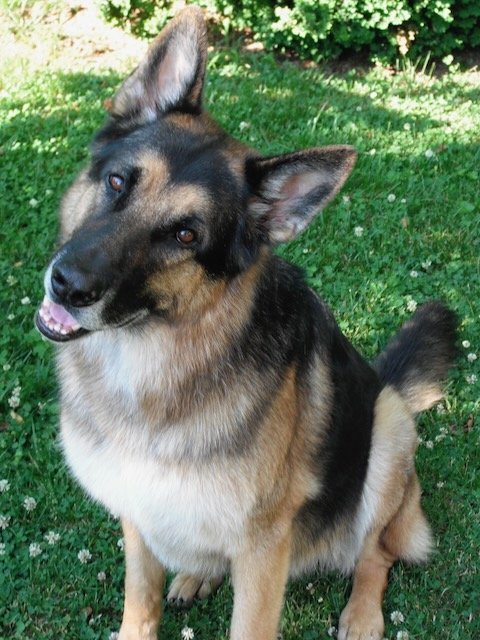A (True) Dog Story
Published on 3.4.24 at garyborjesson.substack.com
The German shepherd asks, “What’s wrong with this picture?” - William Koehler
This week I have a dog story for you. It stands alone, on four paws. However, for those of you faithful readers following this little series of notes on how the medium through which we connect affects our connections, this story is also a coda to the last three notes, and a prelude to the next one, in which I offer the moral of this story.
Aktis the (sometimes) hero
The hero of our story is Aktis, my beloved German shepherd who died 8 years ago. One thing you should know upfront—especially if you’re wary or fearful of German shepherds: Aktis was a warmly affectionate, playful, and sometimes seriously unserious dog. In such moments my partner would compare him (fondly) to a dissolute Bavarian prince, for behind Aktis’s stature and rank she saw a soul drawn to idle pleasures and luxuriousness—not all that serious, and not all that upright. At least not usually. And here begins my tale.
Many years ago we had was a professional acquaintance who also happened to be our neighbor. She occasionally invited us over for a drink or dinner with mutual acquaintances. We were on friendly terms.
Except for Aktis. He wasn’t friendly with her. He wasn’t mean, but he was aloof. When my neighbor would approach to greet him, he’d step back and sit formally beside me, letting her know he wasn’t interested. One time, while we were talking, he rudely turned away from her and sat facing the direction of our house, as if to say, C’mon, Gary, let’s get out of here.
Needless to say, she noticed she was being snubbed. Soon, when she’d see him, she’d often say to him in a playfully recriminating tone, “C’mon Aktis, what’s wrong? Do you think you’re too good for me?” Aktis was unmoved. Sometimes I’d encourage him to be friendly, “Hey Atkis, mind your manners. Go ahead and say ‘hi.’” He’d look up at me, his lovely brown eyes meeting mine, then look back, and do nothing. My ask only underscored his defiance, as if he were saying, Nope, not even though you’ve asked. I’m afraid this is a matter of principle.
Early on when he snubbed her I made excuses, covering for Aktis’s incivility by saying how the breed can be a little skittish and aloof, slow to warm up to people. Which is true. But as it kept happening the excuses wore thin. Ultimately, I just offered a bemused shrug, as if to say, Who can fathom a dog’s mind? To make matters worse, on a couple occasions she saw Aktis be friendlier with a stranger than he ever was with her. Awkward.
There was an obvious interpretation, which our neighbor also suspected, and which made things even more awkward: Aktis didn’t like her because he recognized we didn’t like her. He sensed something was wrong with the picture. A therapist would say he detected an “incongruence” between what was being said and what was actually felt—like when you laugh but feel like crying. Many dogs would not have cared so much about this, but Aktis did. The dog trainer William Koehler was referring to their trademark vigilance when he said German shepherds go through the world asking, What’s wrong with this picture? A great question when you’re on the beat with a police officer, but decidedly unhelpful in this case.
Still, Aktis was right. There was something wrong with the picture, and the obvious interpretation was the true one. The only difference between us and Aktis was that he wasn’t going to pretend to like someone he knew we didn’t like. An unrepentant sensualist, granted, but not so low as a politician.
No doubt he sensed the incongruence between how we acted on the one hand, and how—with all the incriminating thickness of presence at his disposal—he perceived we felt on the other. And he was puzzled. Actually, it seemed more like he was unimpressed that his friends were hanging out with someone they didn’t like. Descended from wolves, dogs, like us, naturally distinguish between friends and enemies, collaborators and adversaries. So, being attached to us, why would he like someone he sensed we didn’t? He stayed loyal to the felt truth of the situation—again, no politician. I found it darkly amusing that we were being thrown under the (moral) bus by our own dog, who was calling attention to the social charade.
The awkwardness with our neighbor did finally get resolved. When we moved. Until then, Aktis remained, rather to our embarrassment, steadfastly loyal to the truth. Every encounter was a reminder of his honesty and our—and my neighbor’s—duplicity.
I include her because I sensed the slight dislike was mutual. But I could never be sure, since—like us—she was capable of hiding her actual view beneath a mask of word and deed that was as friendly as it was (probably) misleading. Still, like Aktis, we had a gut sense. That’s why this story is a coda to the last post (on coming to our senses, doggy style); for it illustrates how irritatingly discerning embodied nonverbal intelligence can be, whether it’s our dog or a young child or even our own gut sense.
Next week I’ll offer the moral of this story, which concerns truth, but mostly lies and bullshit—both of which are harder to discern as we lose our senses. (You can read more stories about Aktis in my book, Willing Dogs & Reluctant Masters.)
If you like this, please subscribe. It’s free and each Monday morning you’ll receive a fresh note to start your week off right.
